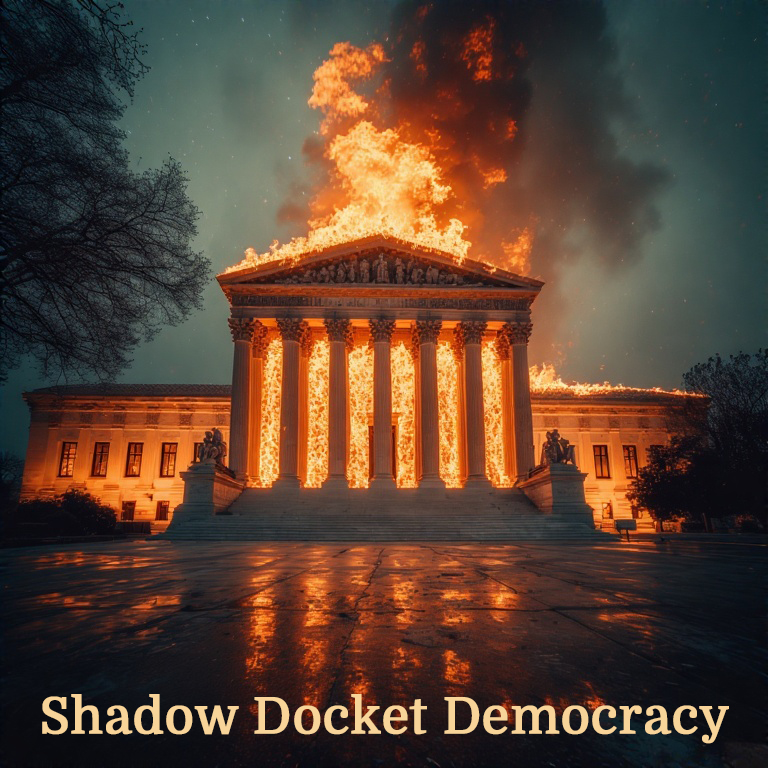
Shadow Docket Democracy
By CLINTON FEIN
July 15, 2025
The Supreme Court’s “shadow docket” is not some mystical legal footnote. It’s the constitutional equivalent of a back-alley deal where your rights get negotiated while you’re sleeping. No oral arguments. No public scrutiny. No explanation. Just a midnight order that can fundamentally reshape American life.
During the combined 16 years of the Bush and Obama administrations, the federal government requested emergency shadow docket interventions just eight times, averaging one request every two years. Half were granted, usually with consensus and minimal drama. That’s how the system should work: deliberate, restrained, transparent.
Then Trump happened.
In just his first four years, his Justice Department filed 41 emergency applications. And the Court served them back like well-trained, undocumented waiters at Mar-a-Lago, granting 28 of them fully or partially. The Muslim travel ban, border wall money, transgender military ban, and federal executions? All shadow docketed. Each one rubber-stamped without proper hearings, without public scrutiny, without the basic fucking decency of explanation. The most divisive political issues of our time: immigration, reproductive rights, voting access—precisely the issues that demand sunlight, not shadows.
The deliberate opacity makes it impossible to know how most of these decisions were made. No votes listed. No reasoning offered. In the 2020–21 term, only 14 of 73 emergency orders included a known vote breakdown. For an institution that supposedly exists to interpret our Constitution, the self-proclaimed originalists are suspiciously secretive about how or why they’re interpreting anything.
I’ve followed the Supreme Court for decades, ever since I had a case before them. They were once a reliable arbiter. But research into shadow dockets, particularly from scholars like Stephen Vladeck, paints a terrifying picture. During the Bush and Obama years combined — sixteen whole years — the federal government used this emergency process just eight times. That’s once every two years, with only half granted. The system worked as designed: deliberate, restrained, transparent.
Even within the Court, the liberal justices — Sotomayor, Kagan, and Jackson — have been sounding alarm bells about eroding trust and procedural shortcuts that undermine the Court’s legitimacy. They see what’s happening: a slow-motion judicial coup conducted through unsigned orders and unexplained emergency rulings.
And then there’s Samuel Fucking Alito — competing toe-to-toe with Clarence Thomas to be the poster child for judicial arrogance — who recently dismissed concerns about the shadow docket as some sort of leftist conspiracy theory or, as he put it, a “catchy and sinister term” that “has been used to portray the court as having been captured by a dangerous cabal that resorts to sneaky and improper methods to get its way. And this portrayal feeds unprecedented efforts to intimidate the court or damage it as an independent institution.” His characterization sounds more like a confession than a dismissal.
This is the same Justice Alito who sees no damage to the credibility to the court by his allowing flying inverted American flags outside his multiple homes, the exact symbol waved by the January 6th insurrectionists who literally shit in the halls of Congress. (He courageously blamed his wife for hoisting them.)
As damaged and dysfunctional as Congress is, even the minority can maneuver things so that elected representatives are forced to go on the record. And if we don’t like how they voted, we have the option to fucking fire their asses by electing new ones.
The hypocrisy is staggering. The Court increasingly legislates from the shadows, rules by fiat, dodges scrutiny, and then acts shocked and defensive when anyone questions its impartiality. With every unsigned order, every unexplained emergency ruling, they’re not just undermining their own legitimacy; they’re undermining the very foundation of constitutional governance.
Democracy Dies in Darkness isn’t just a Washington Post slogan turned into a cruel joke by Jeff Bezos. When power operates in shadows, when decisions affecting millions come without explanation, when accountability becomes optional, we’re no longer a functioning democracy. We’re truly in the dark, and there’s no way for us to turn on the fucking lights.
Select articles, news coverage and books from a plethora of publications covering Clinton Fein’s career as a technologist, activist, artist and speaker.
As an activist, with a Supreme Court victory over the Attorney General of the United States, Fein garnered international attention, including The New York Times, CNN and The Wall Street Journal.
Fein’s thought-provoking and controversial work as an artist caught the attention of prestigious educational institutions, including Harvard University, which recognized its socio-political relevance and ability to provoke crucial conversations about human rights, morality, and the boundaries of artistic expression.
